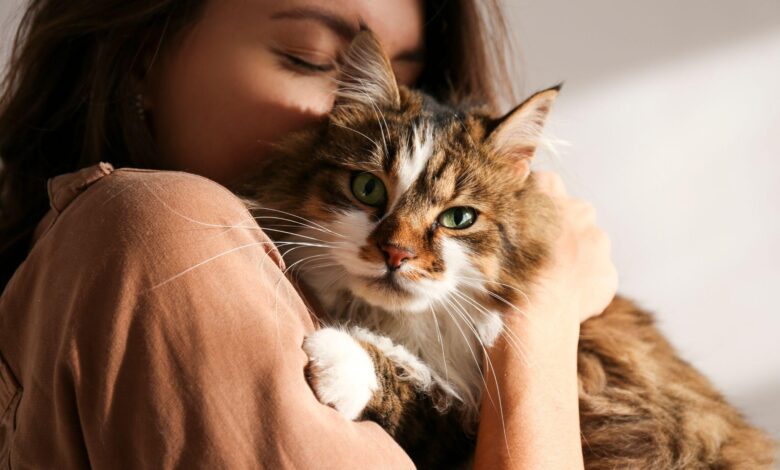
Imagine coming home after a long, challenging day, and there, your cat is waiting to greet you with a gentle purr and a comforting presence. These furry friends add extra joy and calmness to our lives. But do you know cats make an excellent emotional support animal?
Emotional Support Animals, or ESAs, are unique animals that significantly support individuals with emotional and mental health challenges. We’re here to shed light on ESA cats.
This article explains what an ESA cat is, how they differ from regular pets, and what they can do for you.
ESA Cats: Who Are These Special Furry Friends?
An ESA cat is a feline companion that provides emotional support and comfort to individuals facing mental health challenges or emotional distress. Unlike service animals, which undergo specific training to perform certain tasks for people with disabilities, ESA cats offer therapeutic companionship primarily through their presence and affection.
The Role of an ESA Cat
The primary role of an ESA cat is to offer emotional support and alleviate symptoms of emotional or psychological conditions, such as anxiety, depression, or PTSD. Their gentle nature, soothing purrs, and unconditional love can have a profoundly positive impact on their human companions.
ESA cats are not trained to perform specific tasks or skills but instead rely on their innate ability to provide comfort through their company.
ESA Cats vs. Regular Pets
You might be wondering how ESA cats differ from your typical pet cat. To qualify as an ESA, a licensed mental health professional must prescribe a cat to a person with a diagnosable emotional or psychological condition. Many people also opt for getting an ESA certification for additional proof they were prescribed through a legitimate service.
On the other hand, regular pets are animals chosen for companionship, but they don’t have the same official recognition or privileges as ESA cats. These include being allowed in a specific area where regular pets are banned.
Benefits of Having an Emotional Support Cat
Having an ESA cat has many more benefits than their title suggests. Here are several benefits you can expect from having an ESA cat.
Stress Reduction
One of the most prominent benefits of having an Emotional Support Cat is the emotional comfort they provide. These furry friends excel at reducing stress and anxiety. Their gentle purring and affectionate nature calm their owners, helping reduce daily life’s pressures and soothe frayed nerves.
Companionship and Easing Loneliness
ESA cats are steadfast companions for individuals who often feel lonely. They provide a sense of purpose and responsibility, which can be especially helpful for individuals who live alone or struggle with social isolation. Having a furry friend by your side means you’re never truly alone, and their affectionate nature can be a real mood lifter.
Enhanced Mood and Reduced Depression
Spending time with your ESA cat positively impacts your mood. Daily interaction and affection with these felines boost mood and reduce symptoms of depression. The release of endorphins while petting or playing with them contributes to a sense of happiness and well-being.
Improved Quality of Life
ESA cats significantly enhance the overall quality of life for their owners. They encourage physical activity through play and provide a routine, which can be especially beneficial for individuals struggling with mental health challenges. This leads to an overall improvement in your quality of life, making each day more fulfilling.
Improved Social Life
Your ESA cat can also play a role in your social life. Taking them for a walk or visiting pet-friendly places can open doors to conversations with fellow cat enthusiasts. It’s a gentle way to build your confidence and connect with others.
Sense of Security
Many ESA cat owners report a heightened sense of security and safety with their feline companions. The presence of a cat in the home provides reassurance, making you feel less vulnerable, especially if you have anxiety-related issues.
Reduced Medication Dependency
For some individuals, the emotional support an ESA cat provides reduces the need for certain medications to manage anxiety or depression. While this should always be discussed with a healthcare professional, the positive impact of ESA cats on mental health is undeniable.
How to Obtain an Emotional Support Cat
There are numerous significant benefits of an ESA cat that you might be excited about. However, there are certain criteria to obtain an Emotional Support Cat. Check it out below.
Who Is Eligible for an ESA Cat?
Before acquiring an Emotional Support Cat, it’s essential to understand who is eligible. To qualify for an ESA cat, you need to meet the following criteria:
- Diagnosed Condition: You must have a diagnosable emotional or psychological condition, such as anxiety, depression, or PTSD, certified by a licensed mental health professional.
- Prescription Letter: A key step is obtaining an ESA certification letter from the mental health professional. This letter serves as official documentation of your need for an ESA cat.
- Suitable Living Situation: Ensure your living situation allows pets or make necessary arrangements to accommodate your ESA cat, as they are granted housing rights.
Steps to Legally Obtain an ESA Cat
Once you meet the eligibility criteria, here are the steps to legally obtain an ESA cat:
- Consult a Mental Health Professional: Schedule an appointment with a licensed mental health professional. During the consultation, discuss your condition and the potential benefits of an ESA cat as part of your treatment plan.
- Obtain an ESA Certification Letter: If the mental health professional determines that an ESA cat benefits your well-being, they will provide an ESA certification letter. This letter is a crucial document that verifies your need for an Emotional Support Cat.
- Find the Right Cat: With the ESA certification letter in hand, you can now search for the perfect cat. Consider your accommodation and lifestyle to find a cat that suits your needs.
- Inform Your Housing Provider: If you live in housing with a no-pets policy, you should inform your housing provider of your ESA cat. Under the Fair Housing Act, they are legally required to make reasonable accommodations for your ESA cat.
Key Takeaways
ESA cats are more than just furry companions; they are sources of comfort, support, and unconditional love. As you’ve discovered, the benefits of having an Emotional Support Cat extend far beyond the realm of ordinary pets.
By consulting a licensed mental health professional and following the proper legal procedures, you can find your perfect furry partner for a happier and healthier life.








![5 Most Hidden Facts About Westie Puppies ... [Exclusive] 10 shutterstock 197429837 5 Most Hidden Facts About Westie Puppies ... [Exclusive] - 5 ESA Cat](https://www.pouted.com/wp-content/uploads/2014/11/shutterstock_197429837-390x220.jpg?x36710)


